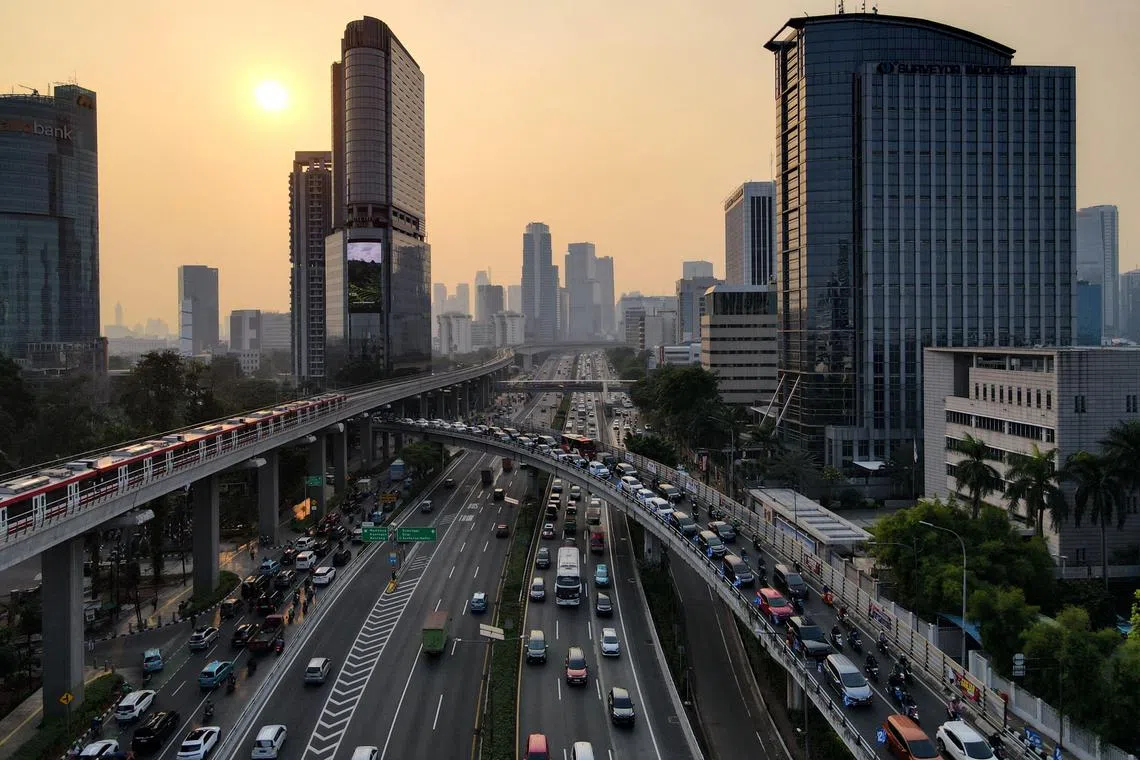Indonesia’s presidential candidates outline vision to boost economic growth, investments

[JAKARTA] In a little over a hundred days from now, on Feb 14 next year, over 200 million eligible voters in Indonesia will cast their ballots for one of three men, with the winner of that contest succeeding Joko Widodo as their next president.
Those three candidates – Anies Baswedan, Ganjar Pranowo and Prabowo Subianto – have all completed their registrations with the Election Commission. They have wasted little time in hitting the ground to explain how they can improve the economy and the lives of the people, if they are successful in the election.
Each of them has, on different occasions in recent weeks, expressed their desire to transform South-east Asia’s largest economy into a high-income country by 2045 – to coincide with the year that Indonesia commemorates 100 years of independence.
Prabowo, the 72-year-old former defence minister, topped a fourth opinion poll in the space of just one week on Thursday (Oct 26), maintaining a slim lead ahead of Ganjar, the former Central Java governor.
The Oct 16-20 survey of 2,567 people, conducted by Indikator Politik Indonesia, put Prabowo top of the list with a support level of 37 per cent – higher than Ganjar (34.8 per cent) and Anies (22 per cent).
Prabowo is hoping it will be third time lucky in his bid to be president, after narrow losses to Widodo in 2014 and 2019. Prabowo has vowed to continue the incumbent’s ongoing programmes, including the relocation and construction of the new capital Nusantara.
He believes he has a trump card over his rivals in the form of his 36-year-old running mate Gibran Rakabuming Raka, who is Widodo’s eldest son.
In a document titled The Prabowo-Gibran Vision seen by The Business Times, the pair has promised to uphold Widodo’s downstreaming policy, which prohibits the export of several essential raw materials such as nickel. Indonesia has the largest nickel reserves on the planet – about 52 per cent of the world’s total.
This downstreaming policy has drawn criticism in the past from the International Monetary Fund, which noted that the ban on certain commodities hinders competition and innovation.
Earlier this week at a gathering of US investors in Jakarta, Ganjar pledged to boost the average growth of South-east Asia’s largest economy to 7 per cent if he is successful in clinching a five-year presidential term.
“Illegal fees must be eradicated, services must be made cheaper, faster. We must provide legal certainty by enforcing the law,” said the 55-year-old at an event organised by the American Chamber of Commerce in Indonesia.
Ganjar, whose running mate is security minister Mahfud MD, vowed to improve governance in the tax office to double the government’s spending capacity, although he did not give specifics.
As for Anies, the 54-year-old former governor of the capital Jakarta, he wants to uphold Indonesia’s business reputation by appointing technocrats to key positions and increasing investment in the manufacturing sector.
The US-educated Anies, who is running together with former manpower minister Muhaimin Iskandar, wants to achieve an average growth rate of 5.5 per cent to 6.5 per cent, with inflation to be within a range of 2 per cent to 3 per cent.
Anies also spoke about creating at least 14 new economic growth centres outside of the main Java island.
Indonesia’s economy expanded by 5.3 per cent last year, thanks to a boost by the commodity upcycle. The expectation is for growth to ease to about 5 per cent in 2023 because of weaker commodity prices.

Tough challenge
The World Bank recently said that Indonesia’s gross national income per capita had jumped 9.8 per cent from US$4,170 in 2021 to US$4,580 last year.
Indonesia also regained its upper-middle income status after losing it in 2021 due to the Covid-19 pandemic. Economists, however, say that Indonesia’s return to this level should not distract from the longer term goal of becoming a developed nation by 2045.
Whoever becomes Indonesia’s next president will face a tough challenge to lift the majority of the population out of the middle-income trap, they said.
To become a high-income nation, Indonesia needs to have annual economic growth of at least 6 per cent per annum, said David Sumual, the chief economist of Bank Central Asia, the largest private bank in Indonesia.
“It’s understandable for candidates to set higher targets to gain people’s confidence during the campaign. However, given the global challenges, I believe that economic growth can only be in the range of 5 per cent to 5.2 per cent,” he said.
Widodo’s successor will need to focus on enhancing growth in an economy driven by domestic consumption, said Fajar Hirawan, a researcher from Center for Strategic and International Studies.
The future president also must do a good job of overseeing the country’s resources, and maintain a delicate equilibrium between the conflicting interests of the US and China.
“The next president has to dare to take unpopular decisions to ensure Indonesia is part of the global value chain. That’s what I don’t see from today’s candidates,” he said.
Decoding Asia newsletter: your guide to navigating Asia in a new global order. Sign up here to get Decoding Asia newsletter. Delivered to your inbox. Free.
Copyright SPH Media. All rights reserved.




